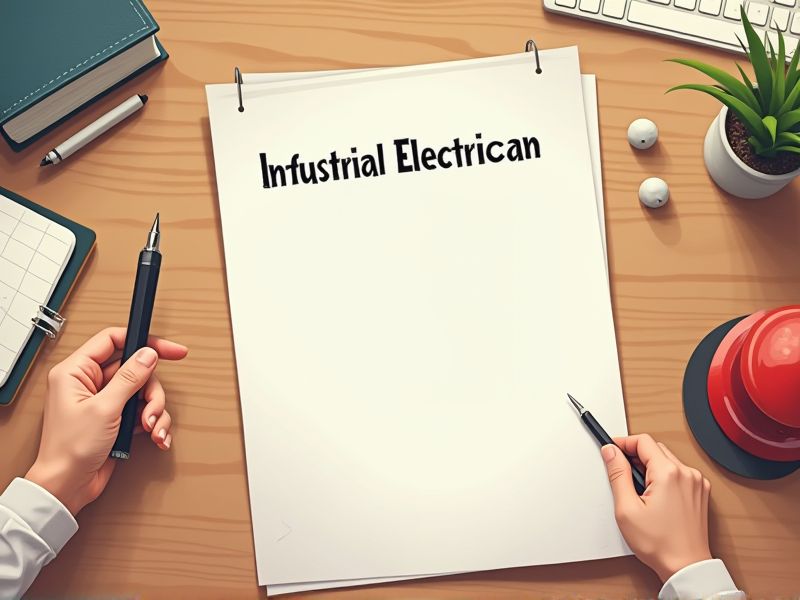
Industrial electricians play a critical role in maintaining and repairing complex electrical systems crucial for industrial operations, requiring specialized knowledge and skills. Certain certifications are essential as they ensure electricians meet industry safety standards and possess proper technical competence. Certifications also increase job opportunities and career advancement prospects by validating an electrician's expertise. Below are several key certifications relevant for industrial electricians.
Journeyman Electrician License
Obtaining a Journeyman Electrician License ensures that an industrial electrician possesses the necessary technical knowledge and skills required to perform electrical work safely and effectively. This license provides assurance to employers and clients that the electrician adheres to established guidelines, reducing the risk of accidents and ensuring compliance with local regulations. Holding the license often leads to better job opportunities, as many employers prefer or require journeyman qualification for industrial projects. It also leads to increased professional credibility and trustworthiness within the industry.
Master Electrician License
Obtaining a Master Electrician License provides an industrial electrician with advanced knowledge and training, ensuring compliance with complex electrical codes and safety standards. The license often serves as a legal requirement in many jurisdictions, allowing electricians to supervise and manage large-scale projects without legal hindrance. It often enhances job opportunities and career advancement, as it signifies an expert level of skill and professionalism. Additionally, having a master license can lead to higher earning potential due to increased responsibilities and expertise.
National Electrical Code (NEC) Certification
Obtaining NEC Certification ensures that an industrial electrician stays updated with the latest safety standards and installation practices, minimizing the risk of electrical hazards. The certification demonstrates expertise and compliance, which can lead to more job opportunities and potential for higher pay. Industries prefer electricians with NEC Certification as it reduces liability concerns and enhances overall operational safety. Continuous professional development through NEC standards keeps electricians proficient in handling complex electrical systems prevalent in industrial settings.
OSHA 30-Hour General Industry Certification
Industrial electricians often work in environments with high-risk factors like electrical hazards, machinery, and potentially dangerous sites. The OSHA 30-Hour General Industry Certification equips them with essential safety guidelines and knowledge to identify and mitigate these risks. As a result, this certification contributes to reducing workplace accidents and ensuring compliance with federal safety regulations. Employers may prefer or require this certification to ensure a safer work environment and decrease liability issues associated with workplace injuries.
NFPA 70E Electrical Safety Certification
Having NFPA 70E Electrical Safety Certification equips industrial electricians with knowledge about current safe work practices due to changes in safety regulations. The certification helps reduce the risk of electrical hazards, improving workplace safety for employees. Many industries require compliance with NFPA standards to meet legal and insurance requirements. The certification can lead to job advancement opportunities, as employers prioritize workers with safety credentials.
Arc Flash Safety Certification
Arc Flash Safety Certification for industrial electricians is crucial because it significantly reduces the risk of electrical injuries, which can result in severe burns or even fatalities. The certification ensures electricians are equipped with the knowledge to handle high-voltage equipment safely, minimizing workplace accidents. Adherence to safety certification standards also helps companies comply with OSHA regulations, which can prevent potential financial penalties and legal issues. It fosters a culture of safety within the workplace, promoting long-term health and operational efficiency for both employees and organizations.
PLC Programming Certification
Possessing a PLC Programming Certification equips an industrial electrician with critical skills to program and troubleshoot automated systems, increasing efficiency in complex industrial settings. Industries rely on automated processes to enhance productivity; thus, certified professionals are more attractive to employers seeking expertise in maintaining advanced machinery. Understanding PLC systems reduces downtime and maintenance costs because electricians can quickly identify and resolve issues. Certification also provides a competitive edge in the job market, often translating into better career opportunities and higher salaries.
HAZWOPER Certification
Industrial electricians often work in environments dealing with hazardous substances, and HAZWOPER certification equips them with the knowledge to handle such situations safely. This certification ensures compliance with OSHA regulations, which is critical for avoiding legal and financial penalties. Proper training reduces the risk of accidents and health issues, enhancing workplace safety. Employers seeking professionals with this certification signal a commitment to safety and well-being, often leading to better job opportunities.
Electrical Inspection Certification
Electrical inspection certification ensures industrial electricians adhere to safety standards, reducing the risk of workplace accidents. Regulatory compliance necessitates certification to meet local and national electrical codes, preventing legal issues. Certification validates an electrician's expertise, building trust with employers and clients. Industrial environments require complex systems; certification confirms the electrician's competence to handle advanced technology.
Energy Management Certification
Energy management certification equips industrial electricians with specialized knowledge in optimizing energy use, resulting in cost savings for businesses. Improved energy efficiency reduces industrial carbon footprints, aligning with environmental regulations and corporate sustainability goals. Knowledge gained from certification enhances electricians' skills, ensuring safe and effective handling of complex energy systems. Certified electricians become more competitive in the job market, attracting higher wages and more employment opportunities.
Summary
By obtaining certifications as an industrial electrician, you enhance your technical expertise and credibility. This competency often leads to an increase in job opportunities and a potential for higher salary offers. Employers frequently perceive certified electricians as more reliable and skilled, resulting in greater trust and responsibility. Certifications further ensure compliance with industry standards, reducing the likelihood of workplace accidents and improving operational efficiency.
